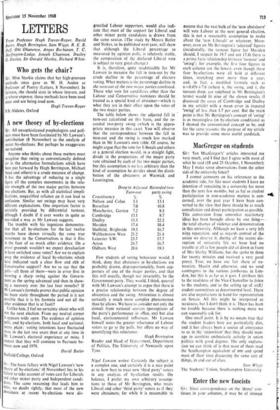A new theory of by-elections
Sir: All unsophisticated psephologists and poll- sters must have been fascinated by Mr Lawson's contribution (8 November) to the analysis of recent by-elections. But perhaps he exaggerates our naivete.
Anyone who thinks about these matters must recognise that swing as conventionally defined or in the alternative formulations which have been put forward by Hugh Berrington, Michael Steed and others) is a crude measure of change. It has the advantage of reducing to a single figure all the complex movements in the rela- nye- strength of the two major parties between two elections. But, as with all statistical simpli- fications, unqualified reliance on it can lead to confusion. Similar net swings may have very different explanations. One important factor is certainly provided by differential turnout, although I doubt if it ever works in quite as one-sided a way as Mr Lawson suggests.
The trouble with his ingenious demonstra- tion that all by-elections for the last twelve months have shown virtually the same true movement to the Conservatives is that it flies in the face of so much other evidence. On a priori grounds wouldn't we expect devaluation to have switched some votes? Are we to explain away the evidence of local by-elections which have indicated such a clear flow and ebb of Conservative support? Are we to say that the polls—all three of them—were in error first in showing a sharp swing against the Govern- ment as the spring advanced and then in show- ing a recovery over the last four months? If Mr Lawson's formula proves that public opinion has been static throughout the period is it not possible that it is his formula and not all the other evidence that is at fault?
Unlike him, I feel no certainty about who will win the next election. From my neutral corner it appears wide open. The evidence of opinion polls, and by-elections, both local and national, seems plain : voting intentions have fluctuated more in the last two years than at any time in Mr Lawson's electoral experience or mine. I suspect that they will continue to fluctuate be- tween now and 1970.






































 Previous page
Previous page